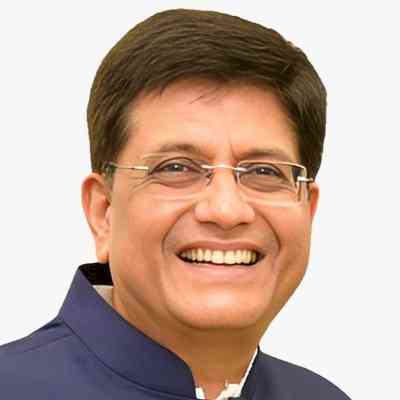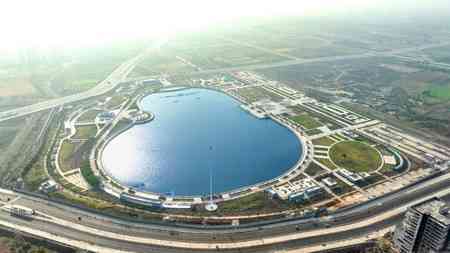From Shrimps to Software -- New Trade Deal Opens Big Market For India

By Piyush Goyal
India has unlocked another gateway to prosperity, signing an innovative trade agreement with a wealthy block of European countries which has a per capita income of over $100,000. This opens a lucrative market for Indian farmers, fishermen and MSMEs, and accelerates PM Modi’s Viksit Bharat 2047 mission.
The Trade and Economic Partnership Agreement (TEPA) with the European Free Trade Association -- Switzerland, Norway, Iceland, and Liechtenstein – that came into force from Oct 1 during the auspicious navratri period, is historic. EFTA countries have pledged an investment of $100 billion over 15 years – the first such commitment in any trade pact in the world. With this, governments of EFTA countries will champion investments into India, creating at least a million jobs, and catalyzing PM Modi’s ‘Make in India’ mission.
Trade Strategy for Viksit Bharat: The Modi government has shed the hesitations of the past, embracing free trade agreements (FTAs) that catapult our products and services into premium, developed markets. These pacts don't just open doors, they sharpen our industries, instilling competitiveness and quality that propel us forward. In July 2025, India sealed a landmark deal with the UK, while talks with the European Union have progressed well. Earlier, PM Modi's decisive hand delivered win-win agreements with Australia and the UAE.
Indian industry stands tall today, brimming with confidence to conquer global arenas while thriving amid competition. Stakeholder have cheered every Modi-era FTA, crafted through exhaustive consultations, unlike the UPA regime's hasty deals, struck without input and often with competing economies that got access to our markets but did not open their own doors adequately.
Making India Attractive - This transformation traces back 11 years, when PM Modi rescued our economy from the "fragile five" tag, and made it a magnet for trade and capital. The Modi government dismantled inherited woes, stagnation, high inflation, corruption and inefficiencies through foundational reforms. The Production Linked Incentive (PLI) scheme alone has drawn ₹1.76 lakh crore in investments by March 2025, spawning over 12 lakh jobs. PM Gati Shakti and the National Logistics Policy have slashed costs and streamlined infrastructure. Our digital backbone—Jan Dhan, UPI, and Trade Connect—has democratized opportunity, powering 65,000 crore transactions worth ₹12,000 lakh crores in six years, lifting the underserved into the financial mainstream.
Investment, Job Creation - Now, EFTA's US$100 billion infusion promises one million direct jobs and countless more indirectly. The investment pledge is quantum leap from the mere US$11.9 billion FDI from these nations over the past 25 years. With India's total FDI hitting US$81 billion in 2024-25, a 14% surge, the real flow could eclipse commitments, thanks to the opportunity seen in the world's fastest growing large economy, and robust Intellectual Property Rights (IPR) laws which are effectively enforced. TEPA bolsters IPR with enhanced cooperation on enforcement and streamlined safeguards, empowering innovators and luring high-tech capital amid rock-solid regulatory certainty.
Farmers and fishermen – Beyond FDI, labor-intensive exports like textiles and gems & jewellry will boom, generating waves of employment. EFTA's affluent consumers crave our agri-goods, tea, and coffee. India has shielded sensitive sectors like dairy, while unleashing opportunities for rice, guar gum, pulses, grapes, mangoes, vegetables, millets, and cashews. Duty cuts on processed delights like biscuits, confectionery, chocolate, and sauces sweeten the deal. Fishermen rejoice as exports of frozen shrimp, prawns, and squid will surge through seamless standards cooperation.
Aspirational Indians: Services get a turbo boost as TEPA paves the way for Mutual Recognition Agreements in nursing, accountancy, and architecture, easing Indian professionals' entry into EFTA. Doors swing wide open for IT, business, cultural, recreational, education, and audio-visual services, slashing technical hurdles via proactive regulatory talks.
Removing Barriers: TEPA transcends tariffs, weaving fair, transparent rules on food safety, animal and plant health, product quality, safety and consumer protection. Clear information sharing, verifications, import checks and certifications prevent these from becoming trade traps, smoothing Indian goods' path to EFTA while inspiring industry to elevate standards at home. Our farmers and manufacturers will craft safer exports, pest-free produce, globally compliant products, thereby uplifting domestic quality too. Better testing and compliance mean healthier meals and reliable goods for every Indian family.
Better Future: These deals ignite passion among manufacturers, service providers and ordinary citizens, who savor premium global products through deeper economic ties. At its heart, TEPA embeds sustainability, championing trade that drives inclusive growth, combats poverty and safeguards our environment. Reaffirming the Paris Agreement and ILO core principles, it fosters collaboration on climate action, gender equality, and biodiversity conservation, ensuring fair wages, safe jobs, and a greener planet. Through green tech exchanges and cooperation, it uplifts workers, slashes inequality and secures a thriving future for our children. A child born in Modi’s India gets as many opportunities at home as in the Alps, the land of fire and ice, or in the land of the midnight sun!
India's destiny is one of active participation, not isolation. As ancient seafarers from our civilizational state navigated uncharted waters with courage, today's 140 crore Indians rise as one—confident, determined and united. The goal is to expand the global footprint, empower through education and digital revolution and build a sustainable future. Together, we restore India's place as a leader in commerce, where trade and technology serve humanity, while innovation and inclusion advance hand in hand.
(The author is the Union Minister for Commerce and Industry)


 City Air News
City Air News 










